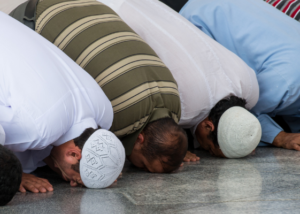Quran
Hadith
Islamic Text
بِسْمِ اللَّهِ الرَّحْمَنِ الرَّحِيمِ
In the Name of Allah Most Merciful Most Kind
Short Answer
No, you cannot pray Salah silently without moving the lips or tongue. Such a prayer is invalid. For Salah to be valid the tongue must move, and you must produce sound. If this is not done, then the Salah is invalid.
Quran
فَاقْرَءُوا مَا تَيَسَّرَ مِنَ الْقُرْآنِ
So recite whatever is easy of the Quran. (Surah al-Muzamil, 20).
You must produce sound
In Quran and Sunnah we are commanded to read or recite (Qira’ah) the Holy Quran. The definition of reading or recital (Qira’ah) requires sound to be produced. However, if this is not done then Qira’ah is unaccomplished. Qira’ah is necessary for the validity of the Salah. Therefore, Salah silently without moving the lips or tongue is invalid.
مُجَرَّد حَرَكَةِ اللِّسَانِ لَا يُسَمَّى قِرَاءَةً دُونَ الصَّوْتِ. (الجوهرة النيرة)
Mere movement of the tongue without sound is not called recitation. (Imam Abu Bakr bin Ali bin Muhammad al-Hadadi, al-Jowharah al-Nayirah).
وَالْأَوَّلُ أَصَحُّ؛ لِأَنَّ مُجَرَّدَ حَرَكَةِ اللِّسَانِ لَا تُسَمَّى قِرَاءَةً بِدُونِ الصَّوْتِ. (تبيين الحقائق شرح كنز الدقائق)
The first opinion is stronger. This is because mere movement of the tongue without sound is not called recitation. (Imam Fakhr al-Deen al-Zayla’i, Tabyeen al-Haqaaiq).
As seen in the Nusoos (texts) above, Hanafi Imams confirmed that sound is required to fulfil the definition of reading or reciting (Qira’ah). As such, for sound to occur, the lips must move. Therefore, reciting in the mind or heart will not suffice. Consequently, you cannot pray silently without moving the lips or tongue is invalid. Therefore, a person who has prayed in this manner must repeat such prayers.
Does movement alone suffice?
There is some difference of opinion in the Hanafi Madhab. A weaker opinion states that moving the lips without actually producing sound will suffice. Whereas the sounder opinion asserts that sound must be produced as well as moving the tongue or lips.
All Hanafi scholars agreed that reciting in the mind or heart without any movement at all is unacceptable. Hence, performing Salah silently without moving the lips or tongue is invalid by agreement.
يَسْمَعُ نَفْسَهُ لَوْلَا الْعَوَارِضُ أَوْ يَسْمَعُهُ مَنْ قَرَّبَ أُذُنَهُ إلَى فَمِهِ شَرْطٌ كَمَا هُوَ مَذْهَبُ الْهِنْدُوَانِيُّ وَهُوَ الصَّحِيحُ خِلَافًا لِلْكَرْخِيِّ الْمُكْتَفِي بِتَصْحِيحِ الْحُرُوفِ. (رد المحتار على الدر المختار)
He hears himself, were it not for impediments. Alternatively, one who has his ear close to his mouth hears from him. This is a condition. As per the view of al-Hinduwani. Which is the sound view. As opposed to al-Karkhi, who sufficed with establishing the letters (even if there is no sound). (Imam Muhammad Ameen bin Umar Ibn Abideen, Radd al-Muhtar).
Must you hear yourself?
Many Hanafi scholars stated that reciting is only valid if you hear yourself. However, this was clarified in the Madhab. It is not an absolute necessity to hear yourself. Rather, the requirement is to produce sound. Therefore if sound has been produced, a person’s prayer and salah will be valid.
وَحَدُّ الْقِرَاءَةِ فِي هَاتَيْنِ الصَّلَاتَيْنِ أَنْ يُصَحِّحَ الْحُرُوفَ بِلِسَانِهِ عَلَى وَجْهٍ يَسْمَعُ مِنْ نَفْسِهِ أَوْ يَسْمَعُ مِنْهُ مَنْ قَرَّبَ أُذُنَهُ مِنْ فِيهِ. (المبسوط)
The definition of recitation in these two prayers is that he establishes the letters with his tongue. Such that he hears from himself, or one who has his ear close to his mouth hears from him. (Imam Shams al-Aimah al-Sarakhsi, al-Mabsoot).
صحح الحروف وحصل به صوت سمع هو أو غيره إذا قرب إذنه إلى فمه رجل سمع. (فتاوى قاضيخان)
He establishes the letters and produces sound that he can hear, or someone else can hear if he were to bring his ear close to his mouth. (Imam Fakhr al-Deen Qadi Khan, Fataawa Qadi Khan).
سَمِعَ هُوَ أَوْ غَيْرُهُ إذَا قَرَّبَ أُذُنَهُ إلَى فَمِهِ، كَذَا فِي فَتَاوَى قَاضِي خَانْ. (الفتاوى الهندية)
He hears it, or someone else, if he were to bring his ear close to his mouth could hear it. (al-Fataawa al-Hindiyah).
Likewise, the Nusoos (texts) above, make it clear that it is not a condition to actually hear yourself recite in Salah. Rather, producing the sound itself is sufficient. The minimum requirement is that if someone were to put his ear next your mouth, such a person would hear recital. This once again demonstrates that you cannot pray silently without moving the lips or tongue is invalid. This is because this is less than the minimum requirement for a valid prayer.
Conclusion
In the Hanafi Madhab, sound must be produced during the recitation or reading in Salah. Otherwise, the prayer will be invalid. The sound does not have to be loud enough for the person to hear himself. Rather, if someone were to place an ear at the mouth then sound must be heard. This is the minimum requirement.
Furthermore, it is important to clarify that the person praying does not have to hear himself. This is because some people become confused and end up reciting so loud that it disturbs those praying near them. There is no need for this – the minimum sound suffices. However, the only issue is that you cannot pray silently without moving the lips or tongue.
Sadly, many Muslims end up with an invalid Salah because they do not know that sound must be produced. As such, it is the duty of Imams to teach people these fundamentals of Salah. Furthermore, it is even more so the duty of individual Muslims themselves to study the basics of Islam and not base religious practice upon hearsay and piecemeal information.
And Allah Most High Knows Best.
–Answered by Shaykh Noorud-deen Rashid (00.00.23)






